STORY about SolidarityIndigenousEnvironment posted on February 13, 2012 by dawn
Tensions Flare over Vancouver-owned Mine in Oaxaca
Three dead and community divided over Fortuna Silver's gold and silver project
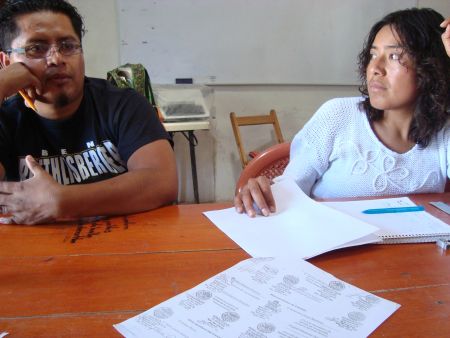
Bernardo Vásquez Sánchez and Rosalinda Dionicio Sánchez in the office of the Coordinating Committee of the United Villages of the Ocotlan Valley. Photo by Dawn Paley.
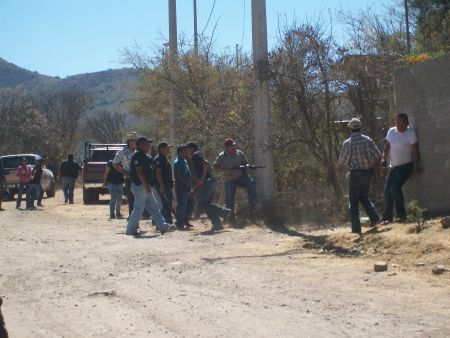
Members of San José defending our rights confront mine opponents. Photo by Coordinating Committee of the United Villages of the Ocotlan Valley.
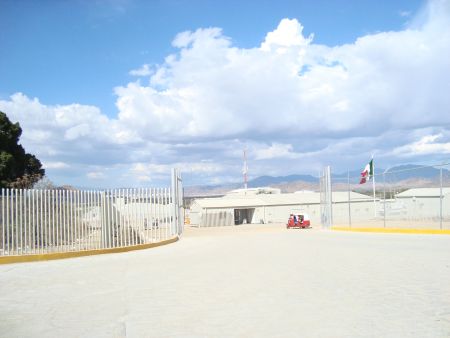
Entrance to the mine. Locals removed the Canadian flag at the gate during the occupation, it was never replaced. Photo by Dawn Paley.
Also posted by dawn:
Also in Environment:
It's been almost three years since hundreds of Zapotec community members took direct action to temporarily shut down Vancouver-based Fortuna Silver's gold and silver mine just south of Oaxaca City, Mexico.
The blockade ended with a massive police raid, during which demonstrators were beaten and 23 people were taken by police and jailed, some for up to three months. Since then, the neighbouring community of San José del Progreso has been deeply divided, and residents have faced a series of difficult and sometimes deadly confrontations.
Three people have been killed since then, most recently Bernardo Méndez Vásquez, who was shot seven times on January 18, 2012, by a municipal police officer. Locals say municipal authorities ordered the police to attack residents, who were refusing to allow a new water system to be installed on their land because they felt it would be used to supply the mine with water.
"Yes there’s problems in the municipality," admits Bernardo Vásquez Sánchez, who lives in San José and works with the Coordinating Committee of the United Villages of the Ocotlan Valley. "But it’s not unconnected, because they started in 2008 and they’re because of the mine, if the company leaves, the municipal problems will be solved," he said in an interview with the Vancouver Media Co-op.
So far, the mining company has avoided being linked with the violence by playing up the fact that people in San Jose are fighting with each other. Fortuna CEO Jorge Ganoza has repeatedly referred to it as “senseless” violence. "It is in no way related to our activities or involves company personnel, and we really hope that the people of San Jose, with the assistance of the state authorities, will find a long-term solution to this senseless violence,” Ganoza told the National Post regarding the recent killing.
The mine, known locally by the name of its subsidiary Minera Cuzcatlán, went into production in late September 2011. Its opponents maintain that Fortuna Silver’s mine is the root of the social problems that plague the once peaceful region. In a press conference following the police shooting of Méndez Vásquez, mine opponents made it clear that they see a direct link between Fortuna Silver and the violence.
“The social and political conflicts that have ended the lives of three people are due to the appearance of the mining company, without the consent of the people, and not to the control and power over the municipality as expressed by various authorities in the state government,” reads a statement signed by over a dozen Oaxacan organizations.
Today, the existence of the mining project is something that residents of San José del Progreso couldn't ignore, even if they tried. The main access road into the town passes directly in front of Fortuna’s operations, complete with its own power station, offices, and a huge stockpile of ore, all surrounded by high chain link fence. Near the entrance to the mine, there’s fencing that looks more like the high, super resistant barrier surrounding the Canadian embassy in Mexico City, where anti-mining activists from all around the country gather regularly in outrage and protest.
In the centre of the village, which is home to about 1,200 people, Vásquez points out that there’s two different taxi stands, one used by people in favour of the mine, and another by those who are opposed. “In one year [the company] managed to cut the town in half, to divide the people, and the dispute become present in all spaces: in the primary school, in the secondary school, in the kindergarten, in the health centre, in city hall, in all of these situations,” said Vásquez.
Because of the company’s refusal to inform and properly involve the community in the decision to allow the mining company to operate in San José del Progreso, the community has been without an Ejidal (communal land owners) commission for three years. This commission effectively exercises control over the communally owned lands in the region, without it, communal land owners are left without means of making officially recognized decisions about the fate of their territories.
City hall has effectively been shut down since January, when municipal authorities and the municipal police fled after the murder of Méndez Vásquez. “Basically the entire town is divided in two parts, one part that has a mayor, and another part that does not have a mayor,” said Vásquez, who together with others has formally requested the dissolution of powers of the municipal government.
In addition, according to sources in Oaxaca City and in the community of San José del Progreso, a group started by the mining company, called “San José in Defense of our Rights,” has taken on a paramilitary role in the community, intimidating opponents of the project.
“Things are so broken that there’s no other way out, the only way, I think, is that the company leaves,” said Father Martin Garcia Ortiz, who served as priest in San José del Progreso until he was beaten and kidnapped by those in favour of the project. He was later jailed and released without charge, and subsequently decided to leave the parish.
Vásquez, too, is determined to see to it that mine packs up and leaves. He and others are worried the project might eventually become an open pit mine, further threatening the region’s already fragile water system. Given Fortuna’s track record, there’s reason to be worried: Simon Ridgway, chair for Fortuna’s board of directors, was subject to two arrest warrants in Honduras because of environmental contamination from an open pit mine now owned by Goldcorp Inc.
“There’s no reason to negotiate with the company, there’s no parameters to say ‘okay, we’ll propose some productive projects or development projects,’ and then the next day I’ll have to leave my village,” said Vásquez. “That doesn’t make sense.”
The site for the Vancouver local of The Media Co-op has been archived and will no longer be updated. Please visit the main Media Co-op website to learn more about the organization.
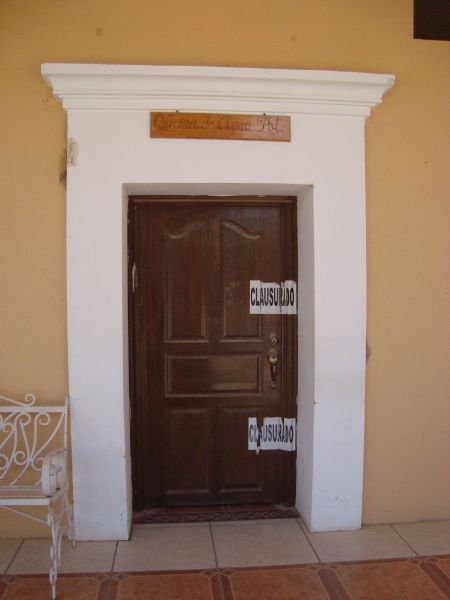
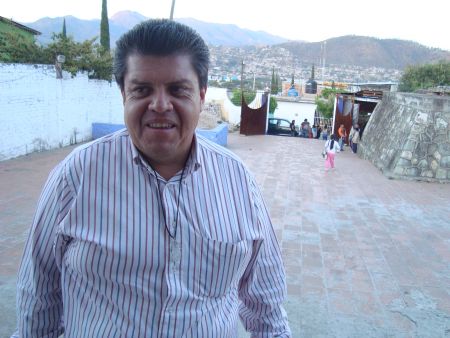
Comments
good read
Thanks Dawn!